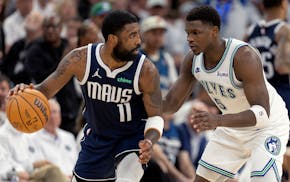Nuggets guard Jamal Murray and Christian Braun were near midcourt, clapping and talking as the time ran out on the Timberwolves on Sunday night.
Wolves star Anthony Edwards looked at Murray, clapped and talked back.
"We love that," Edwards said. "Keep talking that. That's what we like. Well, I love it. He didn't say nothing back, but I'm pretty sure he heard me — they heard me."
Edwards was the only Timberwolf who earned the right to trash-talk the champions on Sunday, scoring 44 points in a 115-107 loss at Target Center. If the Wolves are to win this series, they'll need to support their lead vocalist with a choir.
Sunday's loss dramatized that the Timberwolves' advantages are no longer the Timberwolves' advantages.
The factors and strategies that allowed them to win the first two games of this series evaporated in the three days between Game 2 and Game 3, as Nuggets coach Mike Malone concocted responses to the Wolves' best-laid plans.
Point guard Jamal Murray getting pressed all the way up court, frustrating him? Have others bring the ball up and let Murray hunt his shot, or set a series of screens for him.
The Wolves' switching, smothering half-court defense? Suddenly the Nuggets look patient and able to get any shot they want, with Jokic accepting the Wolves' challenge to beat them with tough two-pointers, Murray making shots from everywhere and Aaron Gordon punishing the Wolves at the rim when they double-team or fail to block out.
The Wolves bullying the Nuggets with size? After Game 1, Jokic joked that he would have to clone himself to compete with the Wolves' three outstanding big men. Now he's proving the original version can operate just fine no matter what the Wolves throw at him.
The Wolves' bench advantage? It's disappeared, with the Nuggets winning the bench scoring battle, 27-13.
Now that the Nuggets have learned to operate against the best defense in the NBA, the Wolves' best players are under extreme pressure to excel offensively.
Sunday, Karl-Anthony Towns, who has been remarkably good since returning from a meniscus injury in April, had his worst game in months, missing his first seven shots.
The Wolves should reconsider feeding him the ball in the post, when his greatest strength is as a big man who can shoot three-pointers and stretch defenses.
The Nuggets have also taken advantage of a weakness that rarely hurt the Wolves during the regular season or during the first six games of the playoffs: Jaden McDaniels' poor three-point shooting.
The Nuggets are letting him stand behind the three-point arc in the corner, and hedging toward the lane, essentially making the Wolves play 4-on-5. Despite being left open, McDaniels attempted just two three-pointers in the first three quarters and missed them both.
What has to worry the Wolves is that they lost when Edwards was at his best. He made good on his promise to play with more intensity in Game 3, and was both efficient and explosive, making tough shots and finishing even against multiple defenders.
Among Edwards' teammates, only Naz Reid was offensively dynamic on Sunday.
Against a great team, situational awareness and end-of-quarter situations can mean everything. The Wolves embarrassed themselves at the end of the first half.
The Wolves had cut the lead to 56-49 with a half-minute left. Then Kentavious Caldwell-Pope made a long three-pointer. Jokic stole the ball from Edwards, leading to a dunk by Michael Porter with less than two seconds remaining.
Nickeil Alexander-Walker then threw an off-target, long pass intended for McDaniels that Murray stole. Murray lined up a 55-foot shot like it was a free throw and drained it.
In 20 seconds, the Wolves had gone from trailing by seven to trailing by 15.
"That was the game," Rudy Gobert said.
Overcoming that deficit was going to require heroics, and only Edwards was up for that challenge. At the end of the third quarter, Edwards was 14-for-21 from the field; his teammates were 16-for-45.
To win another game in this series, the Wolves will have to ensure Edwards is not a solo artist.
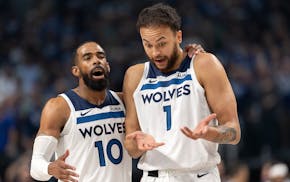
Souhan: How the Wolves should approach improbable comeback
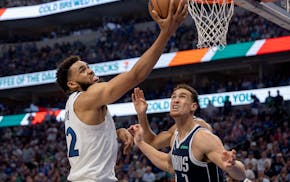
Souhan: KAT falters again, potentially posing hard questions for Wolves
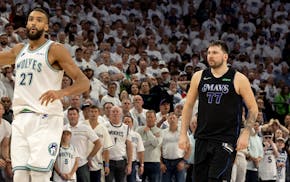
Souhan: Wolves should be motivated by curses of Dallas star Doncic
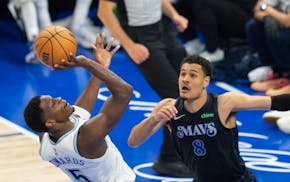
Souhan: Hard to see how Wolves can win if Edwards can't make shots
